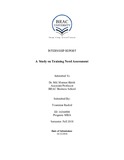| dc.contributor.advisor | Habib, Md. Mamun | |
| dc.contributor.author | Rashid, Yeaminar | |
| dc.date.accessioned | 2019-04-25T04:16:19Z | |
| dc.date.available | 2019-04-25T04:16:19Z | |
| dc.date.copyright | 2018 | |
| dc.date.issued | 2018-12-18 | |
| dc.identifier.other | ID 16364008 | |
| dc.identifier.uri | http://hdl.handle.net/10361/11762 | |
| dc.description | This internship report is submitted in partial fulfillment of the requirements for the degree of Masters of Business Administration, 2018. | en_US |
| dc.description | Catalogued from PDF version of internship report. | |
| dc.description | Includes bibliographical references (page 31). | |
| dc.description.abstract | Training Need Assessment is crucial factor for professionals. In our professional lives we need
more knowledge and skills in addition to academic degrees. Academic qualification and
backgrounds is not enough for today’s fast changing business environment. Moreover continuous
development in terms of training, exposure visits and experiential learning are needed for
professionals to be successful today. If an organization attempts to design suitable training for
the professional of today; they need to understand what type of training is required by the
industries and sectors dominant in the economy. Therefore Training Needs Assessment is the
first stage of any training design process. This study illustrates training need assessment based on
the primary and secondary data.
Training can be described as “the acquisition of skills, concepts or attitudes that result in
improved performance within the job environment”. Training needs analysis looks at each aspect
of an operational domain so that the initial skills, concepts and attitudes of the human elements
of a system can be effectively identified and appropriate training can be specified. Training helps
to improve employee performance, consistency, employee satisfaction, increased productivity
and adherence to quality standards, increased innovation for new strategies and products,
enhances company reputation and personal profile. It helps to reduces gaps between professional
skills and the skills required by the job and department. Therefore the purpose of this study to
identify training programs which are most suitable for professionals’ in advance academic
courses like Masters, MBA, EMBA etc.
The data for this research work will be gathered from primary sources to elicit information from
professional respondents. The primary data will be collected through a well structured
questionnaire filled in by at least one hundred respondents. Secondary data will be composed
from different research paper. This paper will focus on various aspects of Training Need
Assessment like what type of professionals need training, in which sectors and functions
professionals need more training, preferred duration, cost, time and location of professional
training and also seek suggestions from them to better design training interventions for the
prospective trainees. From this primary survey we would explore a proper idea about training
needs for the various types of professionals. | en_US |
| dc.description.statementofresponsibility | Yeaminar Rashid | |
| dc.format.extent | 35 pages | |
| dc.language.iso | en | en_US |
| dc.publisher | Brac University | en_US |
| dc.rights | BRAC University Internship reports are protected by copyright. They may be viewed from this source for any purpose, but reproduction or distribution in any format is prohibited without written permission. | |
| dc.subject | Need assessment | en_US |
| dc.subject.lcsh | Personnel Management. | |
| dc.subject.lcsh | Staff Development.
. | |
| dc.subject.lcsh | Inservice Training. | |
| dc.subject.lcsh | Employees--Training of | |
| dc.title | A study on training need assessment | en_US |
| dc.type | Internship report | en_US |
| dc.contributor.department | Brac Business School, Brac University | |
| dc.description.degree | M. Business Administration | |

